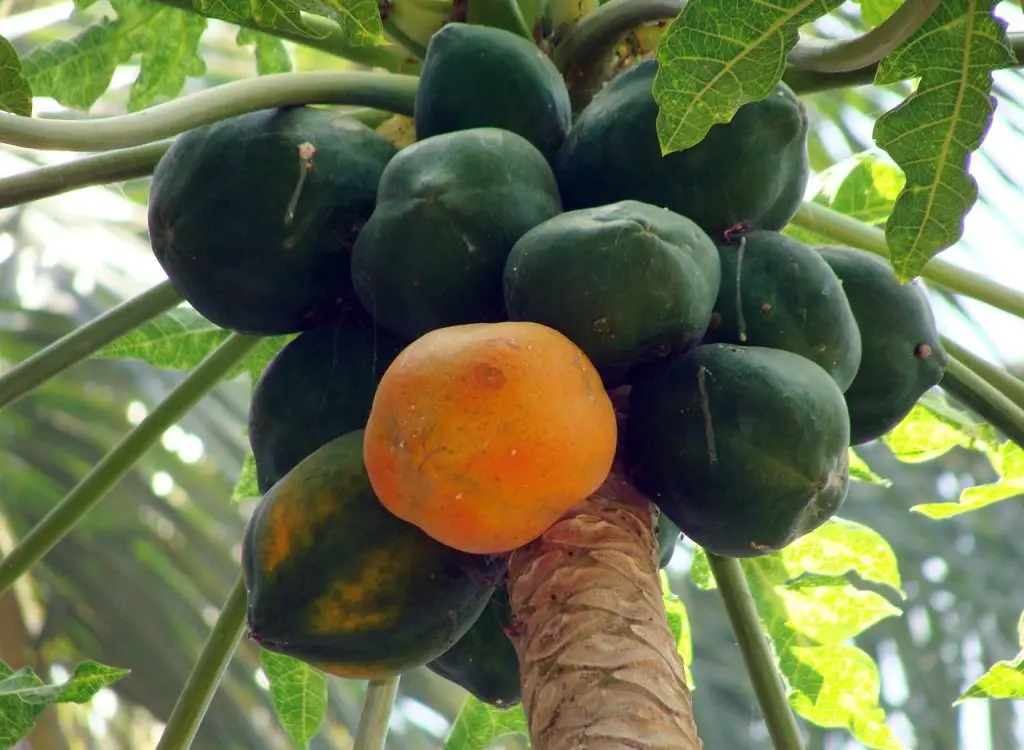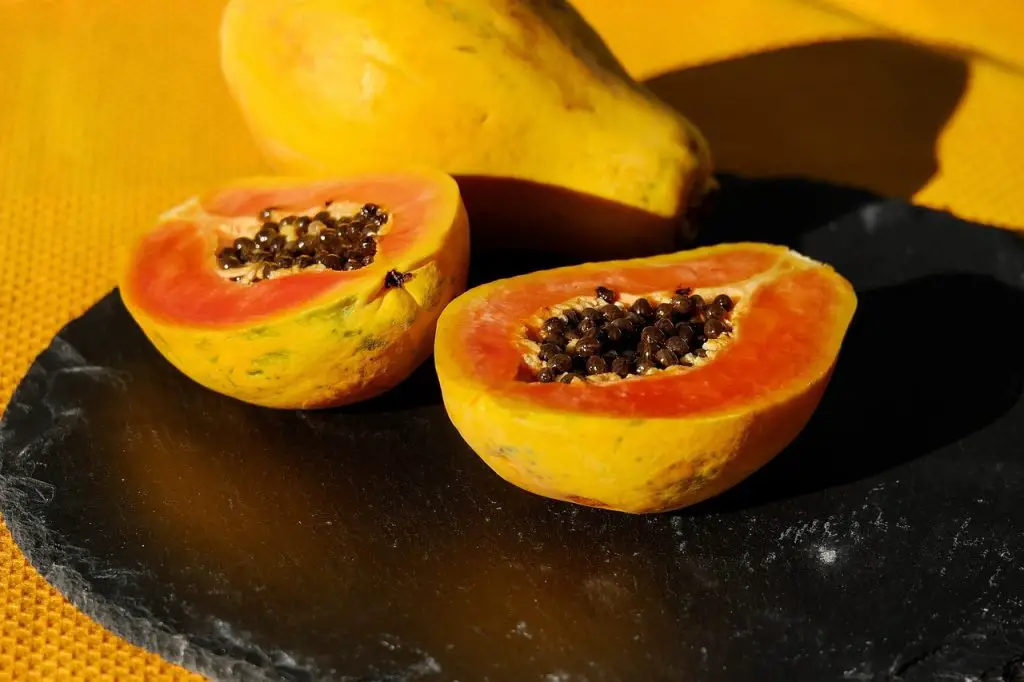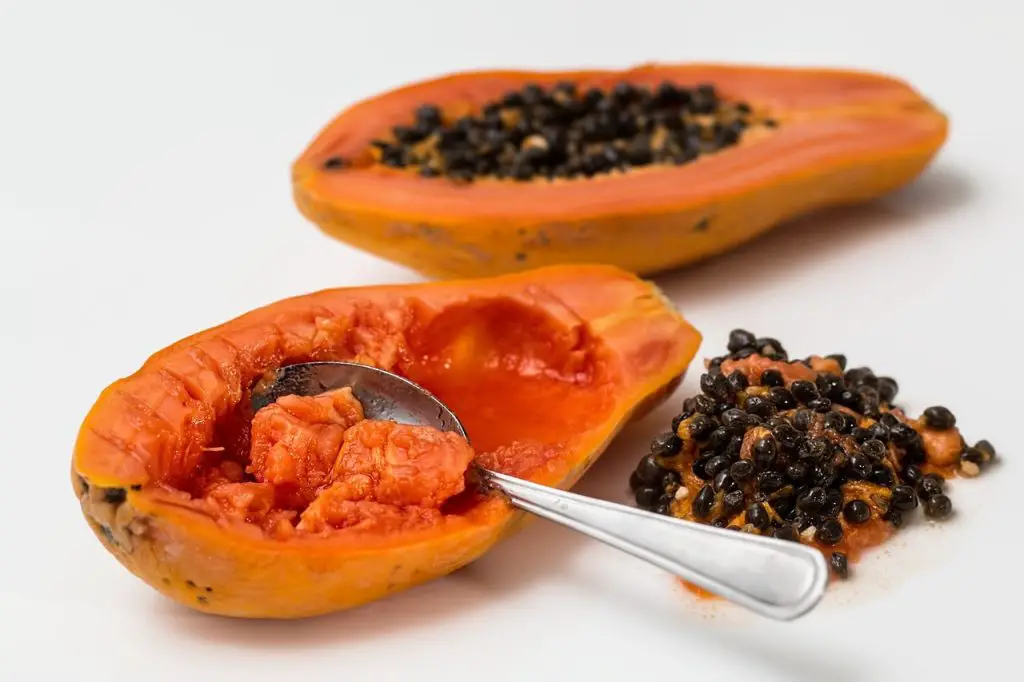Papaya: Here at healthfulhub.com, we participate in affiliate programs and may earn a commission if you make a purchase, at no additional cost to you.
Introduction: The Ultimate Papaya Guide
Papaya, scientifically known as Carica papaya, is a tropical fruit celebrated for its rich nutritional profile and myriad health benefits. Originating from Central America, papaya is now cultivated worldwide in tropical and subtropical regions. Its popularity extends beyond its delightful taste, as it boasts a plethora of health-promoting properties. In this article, we will take a look at papaya from all possible angles to give you a full understanding of this truly special fruit.
USDA Organic Papaya | Freeze-Dried Papayas | No Sugar & Additives | Great Flavor for Drinks, Smoothie, & Beverages | Non-GMO & Vegan Friendly
Nutritional Composition
Papaya is a nutrient powerhouse, packed with vitamins, minerals, and antioxidants. One cup of diced papaya provides an ample dose of vitamin C, meeting over 100% of the recommended daily intake. Additionally, it is a rich source of vitamin A, folate, potassium, and magnesium. The fruit is low in calories and contains negligible amounts of fat and cholesterol, making it an excellent choice for those seeking a nutritious yet low-calorie snack.
Digestive Health
Papaya contains enzymes such as papain, chymopapain, and caricain, which aid in digestion by breaking down proteins into smaller, more easily digestible molecules. These enzymes have been shown to alleviate digestive discomfort, such as bloating and indigestion, making papaya a natural remedy for gastrointestinal issues. Moreover, papaya’s high fiber content promotes regular bowel movements and prevents constipation, contributing to overall digestive wellness.
Immune System Support
With its abundant vitamin C content, papaya plays a crucial role in bolstering the immune system. Potent antioxidant vitamin C helps protect cells from damage caused by free radicals, thereby reducing the risk of chronic diseases and strengthening immune defenses against infections. Regular consumption of papaya can enhance the body’s ability to fight off pathogens and maintain optimal health.

Heart Health
Including papaya in your diet may promote heart health and reduce the risk of cardiovascular disease. The fruit’s high potassium content helps regulate blood pressure by counteracting the effects of sodium and promoting vasodilation, which improves blood flow. Furthermore, papaya’s antioxidants, such as lycopene and beta-carotene, have been linked to a lower risk of heart disease by reducing inflammation and oxidative stress.
Skin and Hair Benefits
Papaya is a beauty elixir for the skin and hair, thanks to its abundance of vitamins and enzymes. Vitamin A and papain promote skin regeneration and repair, making papaya an effective remedy for acne, scars, and other skin imperfections. Additionally, the fruit’s hydrating properties help maintain skin elasticity and prevent premature aging. When applied topically or consumed regularly, papaya can impart a natural radiance to the skin and strengthen hair follicles for healthier, lustrous locks.
Potential Cancer Prevention
Emerging research suggests that papaya may possess anti-cancer properties, attributed to its high antioxidant content and bioactive compounds. Studies have shown1 that papaya extract inhibits the growth of cancer cells, particularly those associated with breast, cervical, and prostate cancers. Moreover, papaya’s ability to modulate immune function and reduce inflammation may contribute to its anti-cancer effects. While more research is needed to fully understand papaya’s role in cancer prevention, preliminary findings are promising.

Eye Health
Papaya is a boon for vision health, primarily due to its high levels of vitamin A, lutein, and zeaxanthin. These antioxidants play a crucial role in maintaining eye health by protecting against age-related macular degeneration, cataracts, and other ocular disorders. Regular consumption of papaya can help preserve vision and reduce the risk of developing eye-related complications as you age.
Anti-Inflammatory Properties
Chronic inflammation is a contributing factor to various diseases, including arthritis, heart disease, and certain cancers. Papaya contains several compounds, such as vitamin C, beta-carotene, and flavonoids, which exhibit potent anti-inflammatory effects. By reducing inflammation in the body, papaya may alleviate symptoms associated with inflammatory conditions and promote overall well-being.
Weight Management
Incorporating papaya into a balanced diet can support weight management and promote healthy weight loss. The fruit is low in calories yet high in fiber, which promotes satiety and helps control appetite. Papaya’s enzymes also promote a healthy metabolism, improve nutritional absorption, and help with digestion. By including papaya in your meals or snacks, you can feel satisfied while maintaining a calorie-controlled diet conducive to weight loss or maintenance.

Bone Health
Papaya contributes to strong and healthy bones, thanks to its impressive array of vitamins and minerals essential for bone health. Calcium, magnesium, vitamin K, and vitamin D are all present in papaya and play vital roles in bone formation, density, and strength. Regular consumption of papaya can help prevent osteoporosis and reduce the risk of fractures, particularly in older adults.
Detoxification
Papaya contains enzymes and antioxidants that support the body’s natural detoxification processes, aiding in the elimination of toxins and waste products. The enzyme papain helps break down undigested protein residues in the intestines, promoting efficient digestion and preventing the buildup of harmful substances. Additionally, papaya’s high water content and fiber facilitate bowel movements, promoting regular detoxification and cleansing of the colon.
Improving Blood Sugar Control
For individuals with diabetes or those at risk of developing the condition, papaya can be a valuable addition to the diet. Despite its natural sweetness, papaya has a low glycemic index, meaning it does not cause significant spikes in blood sugar levels. Moreover, the fiber content in papaya slows down the absorption of sugar into the bloodstream, helping to regulate blood sugar levels. Including papaya in a balanced meal plan can aid in glycemic control and reduce the risk of complications associated with diabetes.

Varieties of Papaya
Papaya comes in several varieties, each with its own unique characteristics in terms of flavor, size, color, and texture. Understanding the differences between these varieties can help you select the right papaya for your culinary needs and preferences.
1. Hawaiian Papaya (Solo or Solo Sunrise)
Hawaiian papayas, also known as Solo or Solo Sunrise, are perhaps the most commonly available variety in many markets. These papayas are small to medium in size, with a vibrant orange flesh and smooth, thin skin that turns from green to yellow as the fruit ripens. Hawaiian papayas have a sweet, tropical flavor with hints of citrus, making them perfect for eating fresh or adding to fruit salads.
2. Mexican Papaya (Maradol)
Mexican papayas, often referred to as Maradol papayas, are larger than their Hawaiian counterparts and have a more elongated shape. They feature a reddish-orange flesh and thick, green skin that turns yellow when ripe. Mexican papayas are known for their bold, sweet flavor and creamy texture, making them ideal for eating on their own or incorporating into smoothies and desserts.
3. Caribbean Papaya (Red Lady)
Caribbean papayas, also known as Red Lady papayas, are prized for their vibrant red-orange flesh and sweet, aromatic flavor. These papayas are typically smaller in size compared to Mexican papayas but larger than Hawaiian varieties. Caribbean papayas have a smooth, thin skin that ranges from green to yellow when ripe. They are commonly enjoyed fresh or used in tropical fruit salads and salsas.
4. Australian Papaya (Golden Papaya)
Australian papayas, often referred to as Golden papayas, are a lesser-known variety characterized by their golden-yellow flesh and unique flavor profile. These papayas are smaller in size and have a slightly elongated shape with a thin, smooth skin that turns from green to yellow as the fruit ripens. Australian papayas have a sweet, musky flavor with hints of honey and citrus, making them a delightful addition to both sweet and savory dishes.

5. Thai Papaya (Kapoho)
Thai papayas, also known as Kapoho papayas, are a popular variety in Southeast Asia known for their small size and intense sweetness. These papayas have a vibrant orange flesh and thin, smooth skin that turns from green to yellow-orange when ripe. Thai papayas are often enjoyed fresh or used in Thai cuisine, particularly in dishes such as papaya salad (Som Tum) or as a refreshing snack on their own.
Selecting and Storing Papaya
When selecting papayas, look for fruits that are firm yet yield slightly to gentle pressure. Avoid papayas with soft spots, bruises, or wrinkled skin, as these may indicate overripeness or spoilage. Once ripe, papayas can be stored in the refrigerator for up to a week. To ripen unripe papayas, leave them at room temperature until they yield to gentle pressure and develop a sweet aroma.
In conclusion, the diverse array of papaya varieties offers something for everyone, whether you prefer the sweet, tropical flavor of Hawaiian papayas or the bold, creamy texture of Mexican papayas. Experimenting with different varieties can add excitement and variety to your culinary adventures while also providing you with a bounty of health benefits.
Made from 100% Organic, Non-GMO, pure and all natural Papayas that contain the Immunity boosting digestive enzyme papain which is a natural antibiotic that can be used to naturally support weight loss detox.
Conclusion: The Ultimate Papaya Guide
In conclusion, papaya is a nutritional powerhouse packed with vitamins, minerals, and antioxidants that promote overall health and well-being. From supporting digestion and boosting immune function to enhancing skin and eye health, papaya offers a myriad of benefits for individuals of all ages.
Whether enjoyed fresh, blended into smoothies, or incorporated into savory dishes, papaya is a versatile fruit that can easily be incorporated into a healthy diet. By making papaya a regular part of your culinary repertoire, you can reap the numerous health benefits it has to offer and enjoy its delicious flavor with every bite.

Michael is a freelance writer. He devotes a great deal of time to reviewing health-related products and is passionate about writing engaging and helpful content. With over twenty years of experience, he writes to help you make well-informed decisions for the health of you and your family.


